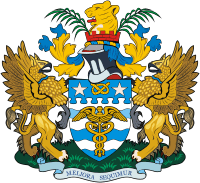 W
WAq Bars is the emblem of Tatarstan. It is an ancient Bulgar symbol translated as "White Leopard" or "Snow Leopard", and has been in use since 1991 as the official symbol of Tatarstan.
 W
WThe coat of arms or national seal of Benin, originally introduced in 1964, was readopted in 1990 after being replaced in 1975.
 W
WThe Coat of Arms of Brisbane is a historic icon; symbolising aspects of not only the City but also the eponymous Governor of New South Wales, Sir Thomas Brisbane.
 W
WThe arms of the Democratic Republic of the Congo has changed several times since 1997. The current one was introduced in 2006 and depicts a leopard head, surrounded by an elephant tusk to the left and a spear to the right. Below are the three words which make up the national motto: Justice, Paix, Travail. It was adopted on 18 February 2006 by President Joseph Kabila.
 W
WThe coat of arms of Gabon was designed by the Swiss heraldist and vexillologist Louis Mühlemann, one of the founding members of the FIAV and also designer of the former coat of arms of Congo. It has been in use since 15 July 1963.
 W
WThe coat of arms of Malawi is based on the earlier heraldic arms of Nyasaland. It is supported by a lion and a leopard, above a scroll reading "Unity and Freedom". A rising sun in a black field, like in the lower field in the shield, is also present in the flag of Malawi.
 W
WThe coat of arms of Ossetia is a red disc featuring a Caucasian leopard with seven white mountains in the background. The mountains symbolize the Ossetian landscape, while the leopard is an iconic inhabitant of the Caucasus mountains.
 W
WThe coat of arms of the Federation of Rhodesia and Nyasaland was designed by M.J. Morris and was granted by Royal Warrant on 22 July 1954.
 W
WThe coat of arms of Somalia was adopted on October 10, 1956 and was created by an unknown Somali man. The leopards which support the shield and the white star were also found on the coat of arms used in Italian Somaliland. Formerly, the arms of Somalia from June 8, 1919 featured a shield divided horizontally by a wavy white line. The top half of the shield was blue, with a leopard in natural color surmounted by a white five-pointed star. Leopards are a common motif in Somali culture.